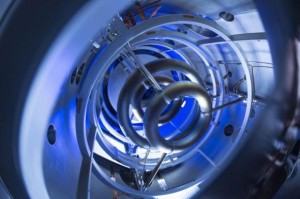
The magnetic coils inside the compact fusion experiment pictured in an undated photo provided by Lockheed Martin.
Credit: Reuters/Lockheed Martin
A few days ago we talked about fusion reactors and the new development out of the University of Washington that hopes to makes fusion a reality. Now we’re talking fusion again – only on a much different scale.
Lockheed Martin is making headlines for their announcement that their compact fusion reactors could be functional within one decade.
The company has been working for some time to develop a source of infinite energy, and have been devoting much time to fusion due to its clean and safe properties.
Their work on compact fusion revolves around the idea of using a high fraction of the magnetic field pressure, or all of its potential, to make devices much smaller than previous concepts. If they can achieve this, a reactor small enough to fit on a truck could provide enough power for a small city of up to 100,000 people.
This from Reuters:
Lockheed’s work on fusion energy could help in developing new power sources amid increasing global conflicts over energy, and as projections show there will be a 40 percent to 50 percent increase in energy use over the next generation.
The company plans to build and test a compact reactor in less than a year, and build a prototype in five. Lockheed believes that this breakthrough could lead to a comprehensive approach to solving global energy and climate change problems.
Does the future of energy interest you? Check out what our Energy Technology Division has to offer. And head over to our Digital Library to see what our scientists are researching in the field of energy storage and conversion.

